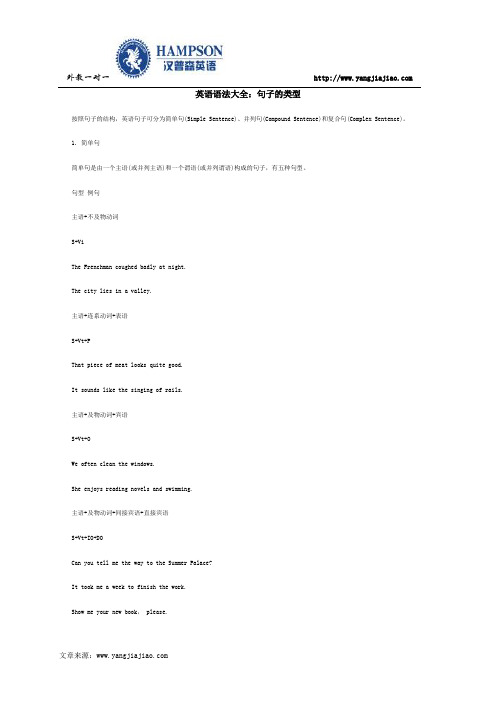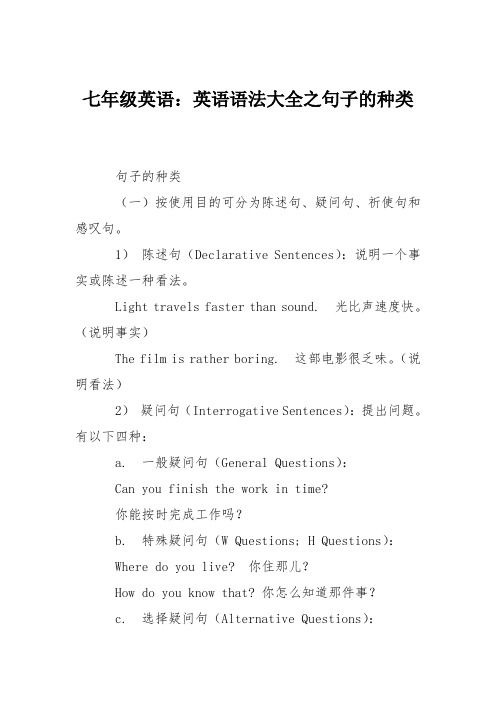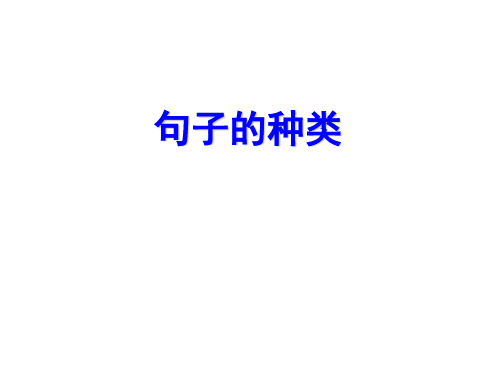【推荐下载】初中英语语法大全:句子的种类
英语语法大全:句子的类型

外教一对一英语语法大全:句子的类型按照句子的结构,英语句子可分为简单句(Simple Sentence)、并列句(Compound Sentence)和复合句(Complex Sentence)。
1. 简单句简单句是由一个主语(或并列主语)和一个谓语(或并列谓语)构成的句子,有五种句型。
句型例句主语+不及物动词S+ViThe Frenchman coughed badly at night.The city lies in a valley.主语+连系动词+表语S+Vt+PThat piece of meat looks quite good.It sounds like the singing of rails.主语+及物动词+宾语S+Vt+OWe often clean the windows.She enjoys reading novels and swimming.主语+及物动词+间接宾语+直接宾语S+Vt+IO+DOCan you tell me the way to the Summer Palace?It took me a week to finish the work.Show me your new book, please.外教一对一 主语+及物动词+宾语+宾语补足语S +Vt+O+CWe call him Li Ming.We keep our classroom clean and tidy.I hear someone singing in the next room.特别提示:so, neither或nor引导的倒装句也属于简单句。
例如:He can play the piano. So can I. 他会弹钢琴,我也会。
Mike didn’t go swimming yesterday. Neither/Nor did Tom. 迈克昨天没有去游泳,汤姆也没去。
初中英语语法--句子的种类(学生版)

初中英语语法-- 句子的种类(学生版)初中英语语法--句子的种类英语中的句子可以按其作用或者按其语法结构(即句子的形式)两种标准分类。
下面是具体的分类依据和结果。
1)按其作用或使用目的,句子可分为:陈述句: This is a truck. 这是一辆卡车。
疑问句:Is this a truck? 这是卡车吗?祈使句: Drive the truck away. 把卡车开走。
感叹句: What a big truck it is! 多么大的卡车! 2)按语法结构,句子可分为:简单句:I am busy. 我很忙。
并列句:I am busy washing, but he is playingMajiang with them.我在忙着洗衣服,但他却在跟他们打麻将牌。
复合句:A lthough I am busy washing, he isplaying Majiang with them.尽管我在忙着洗衣服,他却在与他们一块打麻将牌。
一、陈述句:用于说明一件事,表示一种看法或表达某种心情You didn't do your homework seriously. 你没有认真地做你的作业。
(一般过去时)You mustn't take her to your parents. 你千万不要把她带到你的父母那里去。
(情态动词)She needn't quarrel with him. 她没必要跟他吵。
(情态动词)The house won't be painted. 这所房子将不粉刷了。
(被动语态将来时)She might not notice you. 她可能没有注意到你。
(情态动词)各种时态肯定句变否定句:变成否定句有规则,“是”,“有”“ 将”后加 not,假如没有“是”,“有”,“将”,动词前面加 don't(does't/didn't)。
初中英语语法句子种类(部分图片)

初中英语语法-句子的种类按照英语句子的使用目的和用途,句子可分为四类:陈述句(Declarative Sentence)、疑问句(Interrogative Sentence)、祈使句(Imperative Sentence)和感叹句(Exclamatory Sentence)。
陈述句包括肯定陈述句和否定陈述句。
疑问句有一般疑问句、特殊疑问句、选择疑问句和反意疑问句。
图解语法1. 陈述句说明一个事实或陈述一个人的看法,陈述句包括肯定陈述句和否定陈述句特别提示:肯定陈述句改成否定句或一般疑问句时,如句中有already,some,something,somebody等词,须分别改成yet,any,anything,anybody等。
另外,也要注意,too改成either,both改成neither,all改成none等。
2. 疑问句3. 常用的特殊疑问句4. 特殊的反意疑问句①主句是祈使句时,“will you?”意为“请求”,“won’t you?”表示提醒对方注意。
例句:Look at the blackboard, will you / won’t you?Don’t be late again, will you?②感叹句后的反意疑问,用一般现在时态的否定形式例句:What fine weather, isn’t it?How beautifully she sings, doesn’t she?③陈述部分是“I am …”时,用“aren’t I?”而不用“am not I?”例句:I'm working now, aren’t I?④陈述部分主语是everything,nothing,anything或something 时,疑问句主语用it例句:Something is wrong with my radio, isn’t it?Nothing is difficult, is it?⑤陈述部分的主语是somebody, nobody, everybody, anybody, no one,none, neither 时,疑问句的主语用theyEveryone is here, aren’t they?No one knows about it, do they?⑥陈述部分的主语是:1) this或that时,问句的主语用it2) these或those时,问句主语用they3) there be句时,反意疑问句中用there例句:This is a plane, isn’t it?These are grapes, aren’t they?There was a hospital here, wasn’t there?⑦陈述部分的主语是one时,问句的主语可用one,也可用you (美语用he)例句:One should be ready to help others, shouldn’t one?⑧陈述句中有few, seldom, never hardly,not,rarely,no,nobody,too…to等时,疑问句部分用肯定结构;如由前后缀构成否定词,疑问句部分仍用否定结构例句:He is never late for school, is he?You got nothing from him, did you?It is useless, isn’t it?⑨陈述部分主语是从句、不定式(短语)、动词-ing形式时,疑问句的主语用it例句:What you need is more important, isn’t it?⑩陈述部分由think, believe, suppose, imagine等引导的宾语从句:1) 主语是第一人称时,问句与从句的主谓语一致2) 主语是其他人称,问句与主句的主谓语一致例句:I think he will come, won’t he?I don’t think he can pass the exam, can he?He believed you had seen her before, didn’t he?? have是实义动词时,疑问句用助动词do,does,did;have 是助动词,则不然They had a meeting just now, didn’t they?She’s been to many places of interest, hasn’t she?? 陈述部分有have /has /had to 时,疑问句要用助动词的否定形式例句:You have to water the vegetables now, don’t you?? 陈述部分有had better时,疑问句中用hadn’t刘局:We had better go to school at once, hadn’t we?? 陈述部分有must:1) 作“一定;必须”解释时,疑问句用mustn’t或needn’t;2) 表示推测,作“一定是;必定”解释时,疑问句需根据其后的动词原形选用相应的形式;3) 对过去动作推测时,问句的助动词用did或have;4) 对过去的状态推测时,问句的be用was例句:He must work hard at physics, mustn’t he?You must go to Guangzhou, needn’t you?You mustn’t smoke here, must you?Tom must be at home, isn’t he?She must have finished her work, hasn’t/didn’t she?He must have been a policeman, wasn’t he?? 陈述部分有ought to,used to,疑问句要用 shouldn’t,usedn’t / didn’t例句:Jill used to be a teacher, usedn’t / didn’t she?? 陈述句部分是复合句时,疑问句的主语和助动词要与主句一致例句:He was reading when the teacher came in, wasn’t he?特别提示:反意疑问句是“否定陈述句+肯定问句”时,如回答内容是肯定的,用“Yes+肯定结构”,反之,用“No+否定结构”。
七年级英语:英语语法大全之句子的种类

七年级英语:英语语法大全之句子的种类句子的种类(一)按使用目的可分为陈述句、疑问句、祈使句和感叹句。
1)陈述句(Declarative Sentences):说明一个事实或陈述一种看法。
Light travels faster than sound. 光比声速度快。
(说明事实)The film is rather boring. 这部电影很乏味。
(说明看法)2)疑问句(Interrogative Sentences):提出问题。
有以下四种:a. 一般疑问句(General Questions):Can you finish the work in time?你能按时完成工作吗?b. 特殊疑问句(W Questions; H Questions):Where do you live? 你住那儿?How do you know that? 你怎么知道那件事?c. 选择疑问句(Alternative Questions):Do you want tea or coffee?你是要茶还是要咖啡?d. 反意疑问句(Tag-Questions):He doesn’t know her, does he?他不认识她,对不对?3)祈使句(Imperative Sentences):提出请求,建议或发出命令,例如:Sit down, please. 请坐。
Don’t be nervous!别紧张!4)感叹句(Exclamatory Sentences):表示说话人惊奇、喜悦、愤怒等情绪,例如:What good news it is! 多好的消息啊!(二)句子按其结构可以分为以下三类:1)简单句(Simple Sentences):只包含一个主谓结构句子叫简单句,例如:She is fond of collecting stamps. 她喜欢集邮。
(主) (谓)2)并列句(Compound Sentences):包含两个或两个以上主谓结构的句子叫并列句,句与句之间通常用并列连词或分号来连接,例如:The food was good, but he had little appetite.(主) (谓) (主)(谓)食物很精美,但他却没什么胃口。
英语语法大全-句子的种类

英语语法⼤全--句⼦的种类13. 句⼦的种类(⼀)按使⽤⽬的可分为陈述句、疑问句、祈使句和感叹句。
1)陈述句(Declarative Sentences):说明⼀个事实或陈述⼀种看法。
Light travels faster than sound. 光⽐声速度快。
(说明事实) The film is rather boring. 这部电影很乏味。
(说明看法)2)疑问句(Interrogative Sentences):提出问题。
有以下四种: a. ⼀般疑问句(General Questions): Can you finish the work in time? 你能按时完成⼯作吗? b. 特殊疑问句(W Questions; H Questions): Where do you live? 你住那⼉? How do you know that? 你怎么知道那件事? c. 选择疑问句(Alternative Questions): Do you want tea or coffee? 你是要茶还是要咖啡? d. 反意疑问句(Tag-Questions): He doesn't know her, does he? 他不认识她,对不对?3)祈使句(Imperative Sentences):提出请求,建议或发出命令,例如: Sit down, please. 请坐。
Don't be nervous! 别紧张!4)感叹句(Exclamatory Sentences):表⽰说话⼈惊奇、喜悦、愤怒等情绪,例如: What good news it is! 多好的消息啊!(⼆)句⼦按其结构可以分为以下三类:1)简单句(Simple Sentences):只包含⼀个主谓结构句⼦叫简单句,例如:She is fond of collecting stamps. 她喜欢集邮。
(主) (谓)2)并列句(Compound Sentences):包含两个或两个以上主谓结构的句⼦叫并列句,句与句之间通常⽤并列连词或分号来连接,例如: The food was good, but he had little appetite. (主) (谓) (主)(谓) ⾷物很精美,但他却没什么胃⼝。
英语语法-句子的种类(史上最详细)

4.行为动词的否定句
主语+do/does/did + not + 动词原形
They do not live in shanghai.
He does not do his home work every day. They did not have the meeting yesterday. She did not pass the English exam yesterday.
二去, 断开后,如果后部分的中心词是形容词或副词,去掉它们的修饰词.
三加,如果后部分的中心词是名词就加 what, 是形容词或副词就加 How. 四改变, 调整语序,大小写,句末加 ! 陈述句 Tom is very famous. 一断 Tom is / very famous.
二去
三加 四改变
Tom is / famous.
Yes he had / No he hadn’t.
一般疑问句的否定结构
把副词not 放在一般疑问句主语之后,即构成一般疑问句的否定结构. Is he not ready? = Isn’t he ready? 他没准备好吗? Will he not come ? = Won’t he come ? 他不来吗? Have you not any sisters? = Haven’t you any sisters? 你没有兄弟吗? Can he not do it?= Can’t he do it ? 他做不了吗? Do you not need money?= Don’t you need money? 你不需要钱吗? Does it not rain much here?=Doesn’t it rain much here? 这里不常下雨吗? Did the museum not open? =Didn’t the museum open? 博物馆没有开门吗?
英语语法句子的种类
英语语法句子的种类英语语法句子的种类注意保持身体健康,提高学习效率。
心态决定命运,自信走向成功。
从现在开始,一切都来得及。
不畏风雨锤炼,不顾艰难险阻!人生充满着期待,梦想连接着未来。
下面是给大家带来的英语语法句子的种类,欢迎大家阅读参考,我们一起来看看吧!初中英语语法讲解:句子的种类句子的种类(一)按使用目的可分为陈述句、疑问句、祈使句和感叹句。
1) 陈述句(Declarative Sentences):说明一个事实或陈述一种看法。
Light travels faster than sound. 光比声速度快。
(说明事实) The film is rather boring. 这部电影很乏味。
(说明看法)2) 疑问句(Interrogative Sentences):提出问题。
有以下四种:a. 一般疑问句(General Questions):Can you finish the work in time?你能按时完成工作吗?b. 特殊疑问句(W Questions; H Questions):Where do you live? 你住那儿?How do you know that? 你怎么知道那件事?c. 选择疑问句(Alternative Questions):Do you want tea or coffee?你是要茶还是要咖啡?d. 反意疑问句(Tag-Questions):He doesnt know her, does he?他不认识她,对不对?3) 祈使句(Imperative Sentences):提出请求,建议或发出命令,例如:Sit down, please. 请坐。
Dont be nervous! 别紧张!4) 感叹句(Exclamatory Sentences):表示说话人惊奇、喜悦、愤怒等情绪,例如:What good news it is! 多好的消息啊!(二)句子按其结构可以分为以下三类:1) 简单句(Simple Sentences):只包含一个主谓结构句子叫简单句,例如:She is fond of collecting stamps. 她喜欢集邮。
初中英语语法之-句子的种类共67页
46、我们若已接受最坏的,就再没有什么损失。——卡耐基 47、书到用时方恨少、事非经过不知难。——陆游 48、书籍把我们引入最美好的社会,使我们认识各个时代的伟大智者。——史美尔斯 49、熟读唐诗三百首,不会作诗也会吟。——孙洙 50、谁和我一样用功,谁就会和我一样成功。——莫扎特
初中英语语法之-句子的种类
16、自己选择的路、跪着也要把它走 完。 17、一般情况下)不想三年以后的事, 只想现 在的事 。现在 有成就 ,后 才能更 辉煌。
18、敢于向黑暗宣战的人,心里必须 充满光 明。 19、学习的关键--重复。
20、懦弱的人只会裹足不前,莽撞的 人只能 引为烧 身,只 有真正 勇敢的 人才能 所向披 靡。
初中英语语法之 句子的种类PPT课件
常用not;no; no one; None of us have been to nobody;nothing;neither;Canada.
none; never等词表示否定 我们都没去过加拿大。
否 意义Biblioteka 定 句(2)部分否定:
①I can hardly see anything in the rain. 在雨中我几乎什么东
(2)疑问部分要与陈述部分的 时态保持一致
Tom wen t to the cinema yesterday, didn’t he? 汤姆昨天 去看电影了,不是吗?
—Ann didn’t come to school
(3)答语是肯定的用 “Yes”; last week, did she?
答语是否定的用 “No”。前 否后肯的反意疑问句yes译为 “不”,no译为“是的”
第14页/共65页
考点二 感叹句
类别
结构
例句
What + a/an+adj. +单数可 数名词 + 主语 + 谓语!
What a beautiful mountain it is! 多么美丽的山啊!
以what 引导
What+adj. +复数可数名词 + 主语 + 谓语!
What great inventions he has made! 他的发明多么伟大啊!
你
特殊选择疑问句的构成: Which do you like better, tea or
特殊疑问句+A or B?
coffee? 茶和咖啡你更喜欢哪一个?
第6页/共65页
(四)反意疑问句 附在陈述句后对陈述内容进行反问的句子叫作反意疑问句,也叫附加疑
初中英语语法--句子类型
10) 陈述部分有must 的疑问句,疑问部分根据实际情况 而定。 He must be a doctor, isn’t he? You must have studied English for three years, haven’t you? / didn’t you? He must have finished it yesterday, didn’t he? 11) 感叹句中,疑问部分用be +主语。 What colours , aren’t they? What a smell, isn’t it?
3)否定转移 I don’t think it will be very cold today. (believe, expect, suppose ,imagine)
疑问句
一般疑问句
特殊疑问句 选择疑问句
反意疑问句
一般疑问句主要由be动词、情态动词或助动词来开头。
在一般疑问句的句尾朗读时用升调(↗)。一般只用yes或 no的形式来回答。 She is a teacher. Is she a teacher? Yes, she is./No, she isn’t.
c. 上述部分主句谓语是think, believe, expect, suppose, imagine等引导的定语从句,疑问部分与宾语从句相对应 构成反意疑问句。 I don’t think he is bright, is he? We believe she can do it better, can’t she? 15) 陈述部分主语是不定代词everybody, anyone, somebody, nobody, no one等,疑问部分常用复数they, 有时也用单数he。
2.第一、三人称祈使句是以第一人称和第三人称代词或者 名词等作为祈使的对象,这类祈使句通常以let为引导词表 建议。 Let’s go! Let us go home! Let him be here by 10 o’clock.
- 1、下载文档前请自行甄别文档内容的完整性,平台不提供额外的编辑、内容补充、找答案等附加服务。
- 2、"仅部分预览"的文档,不可在线预览部分如存在完整性等问题,可反馈申请退款(可完整预览的文档不适用该条件!)。
- 3、如文档侵犯您的权益,请联系客服反馈,我们会尽快为您处理(人工客服工作时间:9:00-18:30)。
[键入文字]
初中英语语法大全:句子的种类
(一)按使用目的可分为陈述句、疑问句、祈使句和感叹句。
1) 陈述句(Declarative Sentences):说明一个事实或陈述一种看法。
Light travels faster than sound. 光比声速度快。 (说明事实)
The film is rather boring. 这部电影很乏味。
(说明看法)
2) 疑问句(Interrogative Sentences):提出问题。有以下四种:
a. 一般疑问句(General Questions):
Can you finish the work in time?
你能按时完成工作吗?
b. 特殊疑问句(W Questions; H Questions):
Where do you live? 你住那儿?
How do you know that? 你怎么知道那件事?
c. 选择疑问句(Alternative Questions):
Do you want tea or coffee?
你是要茶还是要咖啡?
d. 反意疑问句(Tag-Questions):
He doesn't know her, does he?
他不认识她,对不对?
3) 祈使句(Imperative Sentences):提出请求,建议或发出命令,例如:
1
